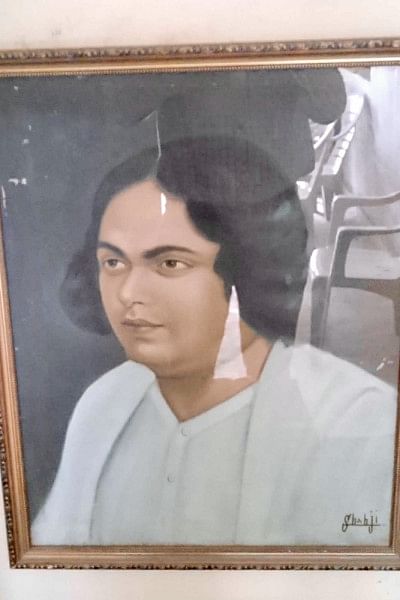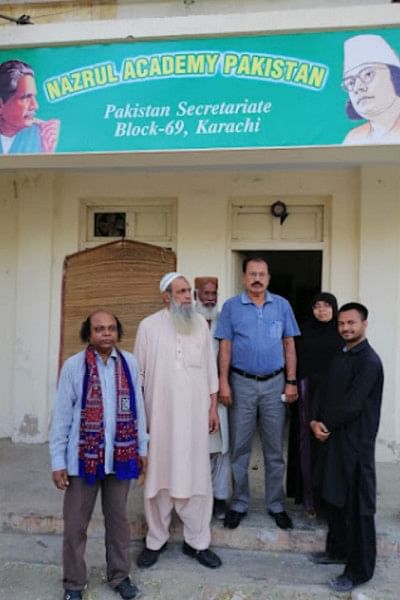The lone treasure trove of Bengali literary heritage in Karachi

The revolution that litterateur and musical polymath Kazi Nazrul Islam brought to Bengali literature is unparalleled. It is known that he joined the British-Indian Army in 1917 during World War I, when he was just 18. Barely out of his teen years, Nazrul travelled across India to join his regiment at Karachi.
Two battalions of 49 Bengal were sent to the Mesopotamian front, but Nazrul stayed at Karachi. The literary works by the Rebel Poet were appreciated by prominent Pakistani politician and lawyer Allah Bukhsh Karim Bukhsh Brohi.

In 1953, Brohi, along with the Bengalis living in Karachi set up an academy in Block-47 of the Pakistan Secretariat Karachi to promote Bengali literature, naming it after Nazrul. This academy perhaps is unknown to many Bengalis living in Karachi, let alone the rest of the world.
Marking the 45th death anniversary of Nazrul, Karachi- born Bengali literature enthusiast Riazuddin Ahmed speaks to The Daily Star regarding the treasure trove of Bengali literary heritage.
The two and half years Nazrul spent in Karachi were significant for him. It was during his posting in Karachi cantonment that he penned several of his celebrated fictional works. The texts incorporated the war as a matrix for staging a multiply inflected persona with autobiographical overtones.
Although the works hold accounts of gruesome battle scenes and nuances of military training, the war does not overshadow the personal emotions, and broader rubric of nationalism and national identity. During his stay at the regiment, the poet was introduced to the Russian Revolution, and he broadened his acquaintance with Persian poetry. He eventually began to translate works of foreign poets to introduce them to Bengali readers.
Social worker and researcher Riazuddin Ahmed has an interest in Bengali literature. "The Bengali community remains a neglected one in Pakistan. The population that was born before the Liberation War and migrated during the partition of 1947 is struggling to receive their ID cards. The new generation, however, received theirs but often remain uninformed about their culture and history," he said.
Growing up in a neighbourhood with Bengali friends, Ahmed acquired understanding of the language. "Although I cannot speak or read Bengali, I understand it. I hold the language and culture very close to my heart," he asserted.
He collects information from various news articles, magazines, personal interviews, as well as books written by army personnel and writers about 1971. Ahmed proactively writes on different social media platforms to highlight issues regarding the fate of the Bengali community in Karachi, notify literary enthusiasts regarding the treasure trove that the city holds. "People barely read newspapers, so I chose social media to disburse information," he added. "Kazi Nazrul Islam's fiery poems and songs inspired the people of the subcontinent, particularly Bengali Muslims, to realise the economic and social oppression to which they were being subjected to by the then British Raj. I am interested in the cultural and historical concepts that we shared. Around 3 million Bengalis live in Pakistan mostly around Sindh Province, in Karachi. I intend to inform the new generation about the legacy of the great Bengali writers."

Ahmed also said that the academy has now shifted to its new location in Pakistan Secretariate, Block-69. Currently it remains closed due to the pandemic. Its library is open to the public for reading. it has works by not only Nazrul, but also Rabindranath Tagore, Sufia Kamal and many other prominent authors.
According to an article published in International The News, the academy is an apolitical nonprofit that only wishes to promote Bengali culture, texts, history, and traditions. It is among the 19 bodies under the Pakistan Academy of Letters (PAL), a state-run organisation that provides impetus to promote literary and cultural activities across the country. The article also mentions the name of Syed Muhammad Faroque, who was elected as the vice-president of the Nazrul Academy, and manages its library. He also arranges literary and other cultural events at the venue.
Karachi's Nazrul Academy boasts a large collection of valuable books on nearly all subjects in the Bengali language, including books by Nazrul as well as those about the great poet.
Around 3,000 to 4,000 works of Bengali literature in English, Urdu, and Bengali are preserved at the academy. Books were added to its library through donations and gifts, including those from the Liaquat National Library. The academy is the Bengali community's only treasure trove of literary heritage in Karachi.
The author is an art researcher and writer in the making.

 For all latest news, follow The Daily Star's Google News channel.
For all latest news, follow The Daily Star's Google News channel. 



Comments